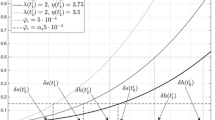Abstract
A railway system needs a substantial amount of maintenance. To prevent unexpected breakdowns as much as possible, preventive maintenance is required. In this paper we discuss the preventive maintenance scheduling problem (PMSP), where (short) routine activities and (long) unique projects have to be scheduled in a certain period. To reduce costs and inconvenience for the travellers and operators, these activities should be scheduled together as much as possible. We present two versions of the PMSP, one with fixed intervals between two consecutive executions of the same routine work, and one with only a maximum interval. Apart from giving a math programming formulation for the PMSP and for its extension we also present some heuristics. In addition, we compare the performance of these heuristics with the optimal solution using some randomly generated instances.
Similar content being viewed by others
References
Budai G and Dekker R (2002). An overview of techniques used in planning railway infrastructure maintenance and its effect on capacity. In: Geraerds WMJ and Sherwin D (eds). Proceedings of the IFRIMmmm (Maintenance Management and Modelling Conference) 2002, Växjö, Sweden. Växjö University, Växjö, Sweden.
Cheung BSN, Chow KP, Hui LCK and Yong AMK (1999). Railway track possession assignment using constraint satisfaction. Eng Appl Artif Intell 12: 599–611.
Chopra S and Meindl P (2001). Supply Chain Management: Strategy, Planning, and Operation. Prentice Hall: New Jersey.
Dekker R, Van Egmond R, Frenk JBG and Wildeman RE (2000). A general approach for the coordination of maintenance frequencies. In: Ben-Daya M, Duffuaa SO and Raouf A (eds). Maintenance, Modeling and Optimization. Kluwer Academic Publishers, Boston/Dordrecht/London, pp 245–282.
Dekker R, Wildeman RE and Van der Duyn Schouten FA (1997). A review of multi-component maintenance models with economic dependence. Math Methods Opns Res 45: 411–435.
Den Hertog D, Van Zante-de Fokkert JI, Sjamaar SA and Beusmans R (2001). Safe track maintenance for the Dutch railways, Part I: Optimal working zone division. Technical report, Tilburg University, The Netherlands.
Esveld C (2001). Modern Railway Track. MRT-Productions: Zaltbommel.
Garey MR and Johnson DS (1979). Computers and Intractability: A Guide to the Theory of NP-Completeness. Freeman: San Francisco.
Grimes CA (1995). Application of genetic techniques to the planning of railway track maintenance work. In: Zalzala AMS (ed). First International Conference on Genetic Algorithms in Engineering Systems: Innovations and Applications, GALESIA, 1995, Sheffield, UK. Conference Publication 414. IEE, University of Sheffield, pp 467–472.
Hariga M (1994). A Deterministic Maintenance-Scheduling Problem for a Group of Non-identical Machines. Int J Opns Prod Mngt 14: 27–36.
Higgins A (1998). Scheduling of railway track maintenance activities and crews. J Opl Res Soc 49: 1026–1033.
Kralj B and Petrović R (1988). Optimal preventive maintenance scheduling of thermal generating units in power systems—A survey of problem formulations and solution methods. Eur J Opnl Res 35: 1–15.
Miwa M, Ishikawa T and Oyama T (2001). Modeling the optimal decision-making for multiple tie tamper operations. In: Proceedings of the fifth World Congress on Railway Research, Cologne, Germany (on CD-ROM).
Sriskandarajah C, Jardine AKS and Chan CK (1988). Maintenance scheduling of rolling stock using a genetic algorithm. Eur J Opnl Res 35: 1–15.
Van Dijkhuizen G and Van Harten A (1997). Optimal clustering of frequency-constrained maintenance jobs with shared set-ups. Eur J Opnl Res 99: 552–564.
Van Zante-de Fokkert JI, Den Hertog D, Van den Berg FJ and Verhoeven JHM (2001). Safe track maintenance for the Dutch railways, Part II: Maintenance schedule. Technical Report, Tilburg University, The Netherlands.
Wildeman RE, Dekker R and Smit ACJM (1997). A dynamic policy for grouping maintenance activities. Eur J Opnl Res 99: 530–551.
Acknowledgements
We thank Gábor Maróti for his useful comments and the experts from Strukton Railinfra, The Netherlands, for providing us information about planning and performing railway maintenance activities.
Author information
Authors and Affiliations
Corresponding author
Rights and permissions
About this article
Cite this article
Budai, G., Huisman, D. & Dekker, R. Scheduling preventive railway maintenance activities. J Oper Res Soc 57, 1035–1044 (2006). https://doi.org/10.1057/palgrave.jors.2602085
Received:
Accepted:
Published:
Issue Date:
DOI: https://doi.org/10.1057/palgrave.jors.2602085




